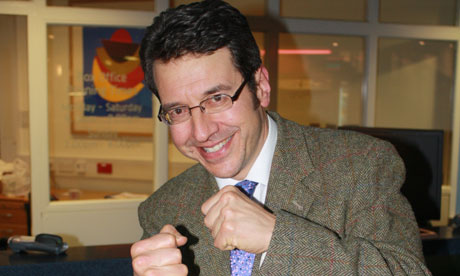Ladies
and Gentlemen and fellow members of the English Democrats
I
am delighted to see you today and welcome you to our Annual General Meeting and
Autumn Conference. The English Democrats were launched in August 2002 and we
are now officially just over twelve years old. That does seem to matter to
journalists and commentators and others because it suggests to them that we are
not going away. Ladies and Gentlemen what do you think? Are we going away?
Picture
of Stephen Elliott
Now
Ladies and Gentlemen I have got a sadder duty to report to you that one of our
leading members from the early days, Stephen Elliott, after a long and
debilitating illness has died. This is the announcement of his death that I
made in my Blog:-
I
have been given the sad news that Stephen Elliott one of the founder members of
the English Democrats died on the 28th July
2014.
Stephen
had suffered for several years with an increasingly debilitating illness. As a
formerly very active man, to become increasingly unable to move was ever more
frustrating.
Stephen
retained an interest in the development of the English Democrats and a member of
the English Democrats and he remained a keen supporter of our work right up
until the end. Indeed, with assistance, he was able to attend the Party's annual
conference in 2012 in Leicester. His death is very sad to report, but he will
be remembered as one of those who gave freely of his time and money to help to
build the foundations of our new politically active English
Nationalism.
Stephen
was a proud Yorkshire man and was a reservoir of amusing stories. At one time
he had been an under-cover police officer pretending to be one of the student
communists in order to keep an eye of subversive Leftists like Jack Straw, who
was Labour’s Foreign Secretary, and was memorably called Sir Christopher Meyers,
the British Ambassador in Washington, a “political pygmy”. As a student Jack
Straw had been a firebrand communist and hater of all things Western, British
and English.
In
later life, after leaving the police, Stephen became a successful entrepreneur
and built-up a significant property portfolio.
Politically
he joined the Steering Committee whose work led to the foundation and launch of
the English Democrats in August 2002 at Imperial College, London. For many
years he was on our National Council and keenly watched our progress and
supported our campaign generously.
Stephen
will be much missed by all those who remember him and our English nationalist
cause is the poorer for his passing. I do wish every condolence to his two
daughters and his family at this sad time.
So
Ladies and Gentlemen I would ask you to all be upstanding and keep a minutes
silence for departed merit.
Thank
you very much Ladies and Gentlemen.
Since
the last Spring Conference your National Council and your Chairman have been
busy trying to advance England’s Cause. Just to mention an example - there has
been Derek Hilling, who appeared for us on BBC News recently with Charles
Haywood. Mark Easton, the BBC’s political correspondent even went so far as to
say that although we are small we seem to have struck a chord with the English.
Also
we have stood in the EU election in May and in the most difficult electioneering
circumstances when UKIP was getting wall to wall coverage we still got 126,000
votes for a campaign expenditure of about £40,000.
Video
of launch
Video
of campaign song
Also
since then outside the National Council, Chris Newey has stood for us in a local
by-election in Walsall. Dr Julia Gasper is also standing in Oxford and also
Sam Kelly in York for us as we speak!
Also
when the Scottish Independence Reference began we registered to support the YES
campaign in the Scottish Referendum which got us a certain amount of coverage.
I was interviewed by the BBC and they did quite a reasonable political biography
for me. I was also interviewed by the Communist paper, The Morning Star, who
did not like us supporting the Scottish nationalist cause, which they seemed to
want to keep preserved for left-wingers!
IPPR
picture
In
mid-April the Universities of Edinburgh and Cardiff working for the IPPR (the
Institute of Public Policy Research which is a Labour supporting think tank
currently being investigated by the Charities Commission for excessive bias
towards Labour), published some advance details of their research in order to
help their friends at the BBC do some coverage of the English reaction to the
Scottish Referendum. That research showed that we are making progress. Over
52% now want a separate English Parliament. We also have been campaigning for
an end to the unfair greater amounts of money being spent on Scotland, Wales and
Northern Ireland than on English people. Now 56% support the abolition of the
Barnett Formula. They agreed with the statement that "Levels of public spending
in Scotland (should) be reduced to the UK average: In 2012-13 identifiable
public spending per capita in Scotland was £10,327, compared to the UK average
of £8,940.
Even
our more recent call for English Independence is now getting greater opinion
poll support than carrying on with the existing political system, 19% support
against 18%!
Since
these polls were conducted in mid-April there has been two broadcast
Independence debates that we English have been permitted to
see.
Picture
of Darling and Salmond
Just
consider what exactly Alistair Darling and Douglas Alexander told all those
English people who listened:-
That
all that is important to Scottish politicians is the interests of Scots. Just
remember that they have all also signed up for the Scottish Claim of
Right.
Just
remember the Scottish Claim of Right.
Video
of Claim of Right
As
the King James’ version of the Holy Bible says: “He that hath ears to hear let
him hear”.
What
do you think the reaction of English people will be to that?
My
view too is that English people will be much more motivated and I am certainly
finding already an audience amongst journalists.
Since
then we have had all the recent hullabaloo from the British Establishment.
This
has really helped us. I did an interview with the Financial Times last week and
this week have done interviews – 7 yesterday and have done an interview for
BBC’s Eastern Region, Sunday Politics recorded for tomorrow.
Later
we are going to have a debate as to what our reaction should be in the event of
a YES vote and also in the event of a NO vote. I hope you will enthusiastically
take part in that so that we can make sure our Party line is the most effective
possible.
So
far as other parties are concerned, the BNP have now gone into utter meltdown
and even Nick Griffin himself has been forced out of office and the leadership
and now he is fighting over the money. I am informed that they have
substantially less party members than we do and are not so much the walking dead
as the merely twitching.
UKIP
on the other hand clearly seem very much on the up at present, but their great
weakness is that a lot people that support them are basically English
nationalists and haven’t fully worked out which Party they ought to be
supporting. I think as time goes on UKIP will disappoint them and we will be in
an ideal position to pick up mass support.
Video
of Nigel Farage on the English Question
I
hear that Nigel Farage has been saying that the English Democrats are finished.
I am certainly not finished. Are you finished?
I
have got a message for Nigel Farage – Not only are we not finished, but we have
barely started!
Just
think that if, on the 19th September, we hear that the Scots have
voted YES, UIKP will have to start thinking of its new name. I think 18 months
later after the negotiations finish and Scotland has become Independent we may
talk sometimes of the Former United Kingdom. Let’s see how that works
for you UKIP.
UKIP
logo
What
do you think Ladies and Gentlemen?
Labour
Conservative
Liberal
Democrats
Ladies
and Gentlemen before I finish I thought I would remind you and talk to you about
a song written by Edward Carpenter who was one of the founders of the Labour
Movement in the days when they were still patriotic and cared about ordinary
English people and before the international Marxist Red Flag became popular with
them. Can I quote you some lines from his famous marching hymn – England
Arise?
England,
arise! The long, long night is over, Faint in the East behold the dawn appear,
Out of your evil dream of toil and sorrow – Arise, O England, for the day is
here! From your fields and hills, Hark! The answer swells – Arise, O England,
for the day is here!
Here
is a rendition of the song. What do you think Ladies and
Gentlemen?
Video
link
Ladies
and Gentlemen – Fellow English Democrats – Fellow English Nationalists – Let’s
all stand together:- England Arise!!!








